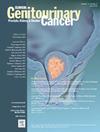Cabozantinib in the First-Line Treatment of Patients With Metastatic Renal Cell Carcinoma, Real-World Data From the Czech Republic and Poland: ICARO-RC Project
IF 2.7
3区 医学
Q3 ONCOLOGY
引用次数: 0
Abstract
Introduction
The treatment of metastatic renal cell carcinoma (RCC) has changed dramatically in the last few years, with different options being available, and with no data comparing these new systemic therapies. Therefore, the value of real-world outcomes (RWO) becomes of great interest to understand the effectiveness of these treatments. Here we analyze the outcome of metastatic RCC patients treated with first-line cabozantinib in a retrospective cohort from the Czech Republic and Poland
Methods
Patients with metastatic RCC treated with first-line cabozantinib in the Czech Republic and Poland were included in a retrospective fashion. Data were collected regarding progression-free survival (PFS), overall survival (OS), response rate and toxicity, with a focus in several subgroups of interest.
Results
We identified 146 patients, the majority of them (80.8%) with clear cell RCC (ccRCC). The median OS was 14.7 months, and the median PFS 8.2 months, with a response rate of 30.3%. CTCAE v3.0 grade 3+4 toxicity was presented in 34.2% of patients. The efficacy of Cabozantinib was maintained regardless of histologic subtype and the presence of sarcomatoid component, although PFS and OS data were numerically better for nonclear cell RCC. Bone and liver metastases were confirmed as independent factor for poor survival in the multivariate analysis.
Conclusions
In our series, Cabozantinib demonstrated its activity in RCC patients in a RWO setting. Our data can be considered comparable with what has been seen in randomised clinical trials, considering the inherent bias present in RWO studies.
卡博赞替尼用于转移性肾细胞癌患者的一线治疗,来自捷克共和国和波兰的真实世界数据:ICARO-RC项目
在过去的几年中,转移性肾细胞癌(RCC)的治疗发生了巨大的变化,有了不同的选择,并且没有数据比较这些新的全身疗法。因此,现实世界结果(RWO)的价值对了解这些治疗的有效性变得非常有意义。在这里,我们分析了来自捷克共和国和波兰的一线卡博赞替尼治疗的转移性RCC患者的结果。方法回顾性分析了捷克共和国和波兰的一线卡博赞替尼治疗的转移性RCC患者。收集有关无进展生存期(PFS)、总生存期(OS)、反应率和毒性的数据,重点关注几个感兴趣的亚组。结果146例患者中,绝大多数(80.8%)为透明细胞RCC (ccRCC)。中位OS为14.7个月,中位PFS为8.2个月,有效率为30.3%。34.2%的患者出现CTCAE v3.0 3+4级毒性。无论组织学亚型和肉瘤样成分是否存在,卡博赞替尼的疗效都保持不变,尽管非透明细胞RCC的PFS和OS数据在数值上更好。在多因素分析中,骨和肝转移被证实是生存率差的独立因素。结论:在我们的研究中,卡博赞替尼在RWO环境下对RCC患者显示了其活性。考虑到RWO研究中存在的固有偏倚,我们的数据可以被认为与随机临床试验中的数据具有可比性。
本文章由计算机程序翻译,如有差异,请以英文原文为准。
求助全文
约1分钟内获得全文
求助全文
来源期刊

Clinical genitourinary cancer
医学-泌尿学与肾脏学
CiteScore
5.20
自引率
6.20%
发文量
201
审稿时长
54 days
期刊介绍:
Clinical Genitourinary Cancer is a peer-reviewed journal that publishes original articles describing various aspects of clinical and translational research in genitourinary cancers. Clinical Genitourinary Cancer is devoted to articles on detection, diagnosis, prevention, and treatment of genitourinary cancers. The main emphasis is on recent scientific developments in all areas related to genitourinary malignancies. Specific areas of interest include clinical research and mechanistic approaches; drug sensitivity and resistance; gene and antisense therapy; pathology, markers, and prognostic indicators; chemoprevention strategies; multimodality therapy; and integration of various approaches.
 求助内容:
求助内容: 应助结果提醒方式:
应助结果提醒方式:


